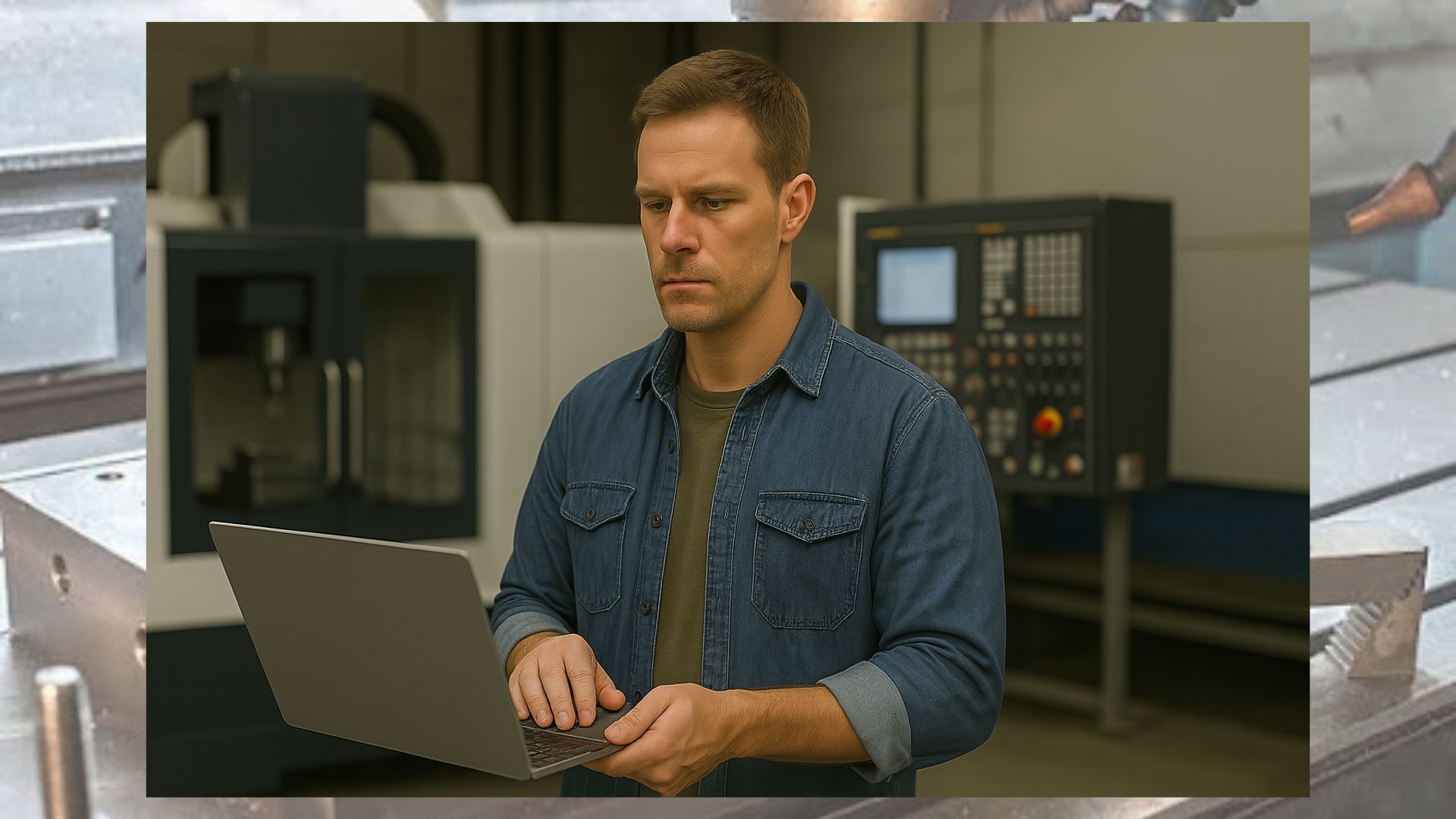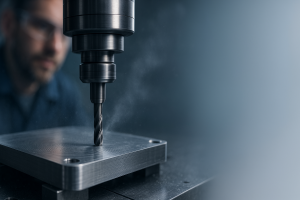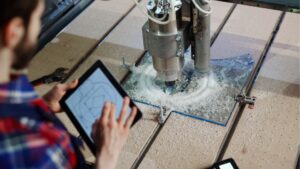No Responses
July 25, 2025
CNC milling is a precise manufacturing process that uses computer-controlled machines to shape materials into custom parts. It plays a vital role in industries like aerospace, automotive, and medical, where accuracy and consistency are non-negotiable. With so much depending on the quality of machined components, choosing the right
CNC milling company can directly impact product performance, timelines, and overall costs. This guide will walk you through the key factors to consider when selecting a CNC milling partner—from technical capabilities and certifications to turnaround times, pricing, and support—so you can make an informed decision with confidence.
Understanding CNC Milling: A Quick Primer
➤ What is CNC milling?
CNC milling is a subtractive process where computer-controlled machines cut and shape solid materials, such as metal or aluminium, and more into precise, custom parts based on digital designs.
➤ Key Industries That Rely on CNC Milling
Industries such as aerospace, medical, and automotive rely on CNC milling machining for reliable, high-precision components. Many trusted
CNC machining providers in Brisbane serve these sectors with tailored solutions.
➤ Common CNC-Milled Parts and Their Applications
CNC milling produces parts such as engine components, surgical instruments, electronic housings and more used in vehicles, medical devices, industrial machines, and other applications, where tight tolerances are essential.
Core Qualities of a Reliable CNC Milling Company
➤ Experience and Industry Reputation
A reliable CNC milling company should have several years of industry experience backed by strong client testimonials. Look for providers with niche expertise, such as those specialising in medical-grade or aerospace-standard components. Reviewing case studies or past projects can provide insight into their technical capabilities, consistency, and the effectiveness of their results across various industries.
➤ Certifications and Compliance
Ensure the company holds certifications such as ISO 9001 or AS9100, which demonstrate a commitment to quality. Compliance with safety and material standards is essential, and environmental certifications can be an added bonus for sustainable operations.
➤ Range of Capabilities
A skilled CNC provider should offer milling services with
3-axis, 4-axis, and 5-axis capabilities. They must handle a wide range of materials—from aluminium and plastics to exotic alloys—and ideally offer additional services like turning, EDM, finishing, and assembly.
Technology and Machinery
Modern Equipment
A reliable CNC milling company should invest in modern, up-to-date machines that deliver consistent accuracy and efficiency. Advanced equipment improves reliability, reduces downtime, and supports a broader range of materials and part complexities for various industries, ensuring precision at every stage of production.
➤ CAD/CAM Software Integration
Integration with advanced CAD/CAM software enhances design precision and streamlines the manufacturing process. It allows seamless conversion from digital models to real-world parts, reduces human error, and enables quicker modifications during prototyping, ensuring accuracy and design integrity throughout the machining workflow.
➤ Automation and Smart Manufacturing Tech
Automation technologies such as robotic arms and smart scheduling systems improve productivity, reduce labour costs, and support around-the-clock production. Companies embracing Industry 4.0 and smart manufacturing can deliver faster, more consistent results, helping clients meet tight deadlines without compromising quality or precision.
Tolerances and Precision
Top-tier CNC companies offer both standard and tight-tolerance machining based on application needs. Precision is crucial in industries like aerospace or medical, where even minor deviations can lead to component failure or compliance issues. Always check a provider’s capability to maintain these standards consistently.
➤ Examples of Tight Tolerance Applications
Tight tolerances—sometimes within microns—are often required in aerospace brackets, surgical tools, and fuel system parts. These components must fit and function perfectly, which means a CNC company must have not only the right equipment but also the expertise to deliver this level of precision repeatedly.
Prototyping and Volume Production
A good CNC partner should accommodate both rapid prototyping and high-volume production. This flexibility allows you to test and refine product designs quickly, then scale up with confidence, knowing that the same standards of quality will be maintained in bulk orders.
➤ Quick Turnaround for Prototypes
Speed is vital when bringing a new idea to life. CNC companies offering fast prototyping services help reduce development time and cost. Quick delivery of accurate prototypes allows businesses to validate designs early and move to production with fewer risks or last-minute changes.
➤ Design for Manufacturability (DFM) Support
DFM support helps refine your part design to enhance function, minimise waste, and lower production costs. When a CNC company collaborates during the design stage, it ensures that parts are easier to machine, more reliable in use, and produced faster, resulting in better overall outcomes.
Quality Assurance Processes
➤ In-House Quality Control Team
A dedicated quality control team ensures each part meets specifications, maintaining consistency and reducing the risk of errors or defective components.
➤ Use of CMM and Other Inspection Tools
CMMs and advanced inspection tools allow precise measurement and validation of complex geometries, ensuring all parts meet strict dimensional tolerances.
➤ Step-By-Step QA Process from Raw Material to Final Inspection
Comprehensive QA procedures track quality from raw materials through every production stage to final inspection, ensuring reliability and performance.
➤ Traceability and Documentation Practices
Thorough documentation and traceability practices guarantee full visibility into materials, processes, and inspections, supporting accountability and compliance in regulated industries.
Turnaround Time and Flexibility
➤ Lead Times for Quotes, Prototyping, and Bulk Orders
A reliable CNC partner should provide quick quotes, fast prototyping, and reasonable lead times for bulk orders to keep your project on track.
➤ Flexibility in Urgent or Custom Jobs
The ability to adapt to urgent requests or complex custom specifications shows a company's commitment to customer needs and operational flexibility.
➤ Inventory Management and On-Demand Manufacturing
On-demand manufacturing and smart inventory systems help reduce lead times, lower costs, and ensure parts are available exactly when you need them.
Communication and Project Management
➤ Dedicated Account Managers or Engineers
Having a dedicated point of contact ensures smooth coordination, technical support, and a better understanding of your project's specific needs and goals.
➤ Transparent Communication During all Project Phases
Clear, timely communication throughout quoting, production, and delivery builds trust and helps address issues quickly before they impact timelines or quality.
➤ Digital Tracking and Progress Reports
Real-time updates and digital progress reports provide visibility into project status, enabling better planning and fewer surprises during production.
Pricing and Cost Transparency
➤ Factors That Affect CNC Milling Cost
Material type, part complexity, tolerances, and order volume are key cost drivers that influence the final pricing of CNC milling projects.
➤ Importance of Detailed, Itemised Quotations
Clear, itemised quotes help you understand exactly what you’re paying for, making budgeting easier and preventing misunderstandings later in the project.
➤ Avoiding Hidden Fees or Surprise Charges
A trustworthy CNC partner will provide transparent pricing upfront, ensuring there are no unexpected charges during or after production.
➤ Cost Vs. Value: Why Cheapest Isn't Always Best
Lowest cost may compromise quality. Investing in a reliable CNC provider often leads to better results, fewer delays, and longer-lasting parts.
Logistics and Delivery
➤ Local vs. International Providers
Local CNC providers often offer faster communication and delivery, while international options may offer cost savings but longer lead times and potential delays.
➤ Shipping Capabilities and Packaging Standards
Proper packaging and secure shipping methods protect precision parts during transit, reducing the risk of damage and ensuring components arrive ready for use.
➤ On-Time Delivery Record and Logistics Partnerships
A strong on-time delivery record and reliable logistics partners indicate a company's ability to meet deadlines and maintain smooth, uninterrupted supply chains.
After-Sales Support and Ongoing Partnership
➤ Post-Production Services
Value-added services like coating, heat treatment, or labelling streamline your supply chain and ensure parts are ready for final use upon delivery.
➤ Warranty or Support for Defective Parts
Reliable CNC companies stand behind their work by offering warranties or providing prompt support for any defective parts, ensuring peace of mind after production.
➤ Long-Term Relationship Potential and Scalability
Choosing a partner who can scale with your needs supports long-term growth, consistent quality, and smoother project management across future production runs.
Red Flags to Watch Out For
➤ Lack of Clear Communication or Vague Timelines
If a CNC company struggles to provide clear updates or realistic timelines, it could indicate poor project management or future delays.
➤ No Portfolio or Client References
A lack of past work examples or client testimonials may signal inexperience or a reluctance to showcase the quality of their services.
➤ Poor Reviews or Inconsistent Quality
Negative reviews or reports of inconsistent output can reveal underlying issues with quality control, customer service, or reliability.
➤ Reluctance to Share Certifications or Inspection Processes
If a company fails to share its certifications or QA practices, it may lack proper standards or transparency, which are crucial for high-stakes manufacturing.
Conclusion
Choosing the right
CNC machining & milling company is essential for achieving precision, reliability, and value in your projects. By evaluating technical capabilities, certifications, communication, and quality standards, you can partner with a provider who meets your needs. Take time to assess thoroughly before making a commitment—it’s worth the investment.
Ready to get started with a trusted CNC machining partner? Visit
mkcnc.com.au to request a quote or schedule a consultation with the experts at MK CNC. Whether it’s prototyping or full-scale production, they’re here to help bring your project to life with precision and care.



